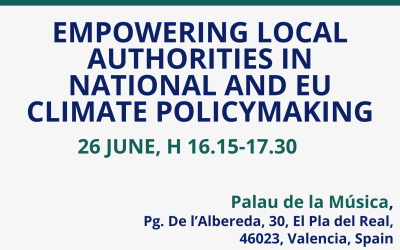EUCityCalc’s pilot cities identified the common barriers and opportunities they find on their journey towards decarbonization
To limit global warming to 1.5°C above pre-industrial levels, greenhouse gas emissions must be rapidly cut across all levels of government and society. While national and supranational levels of government design overall planning, regulations, and incentives to reduce emissions and to embed climate action in other economic and social policies, these efforts do not always adequately consider implementation at regional and local levels.
It is clear that cities and local governments play an essential role in implementing many of these policies and measures on the ground in order to actually achieve national climate goals. Cities’ proximity to and continual dialogue with local citizens and other stakeholders places them in a unique position to understand and leverage the opportunities and challenges for climate action in their local and domestic contexts, and to make a real difference towards national goals.
Local authorities, such as the ten pilot cities in EUCityCalc, often demonstrate a high level of ambition to cut their emissions that can even go beyond national-level targets, but they also face a range of challenges that can slow their climate transition.
From the lack of climate funds to communication and skills gaps: the EUCityCalc report on factors affecting the climate transition
In order to better identify and understand the barriers and opportunities that influence cities’ climate transition pathways, EUCityCalc has prepared an assessment report of the positive and negative factors at the national and EU levels. Building on a comprehensive survey filled in by EUCityCalc cities and on subsequent discussions in the project, the report explores national-local policy alignment, finance for the climate transition, as well as the level of technical expertise and dedicated staff at the local scale to plan and implement cities’ climate measures.
In many cases, the report finds that national-level climate policy frameworks do not adequately consider the role of local authorities or consult with them in defining the country’s climate ambition. This represents a missed opportunity on many fronts, including to unlock the mitigation potential of cities that may be strongly motivated to take action but require additional financial or technical support in order to properly do so.
Similarly, local authorities often do not have easy access to the relevant ministries in charge of the environment and urban affairs, meaning that if the national government does not make it a priority to engage with local actors, then little to no vertical coordination occurs in practice. Many cities also struggle to secure reliable access to climate finance, which can be due to specific national arrangements or complex application processes for national and EU funds, on which local authorities may not have enough dedicated staff to engage.
Despite these challenges, cities are strongly motivated to advance on climate action – as evidenced among other things by the pilot cities’ involvement in a project like EUCityCalc – and, in fact, the good news is that many of the challenges identified in the report represent opportunities.
For example, in order to better understand the needs of cities and to take into account their important contribution to climate objectives, national ministry(ies) with competences on local government affairs and climate change should establish, where it does not exist, a permanent channel or platform whereby cities can directly engage in dialogue with representatives from the ministry – this is an important way to centralise information and facilitate communication between national and local authorities.
To find out more about key challenges and opportunities to accelerate climate action at the local-level, check out the full details in the report!











